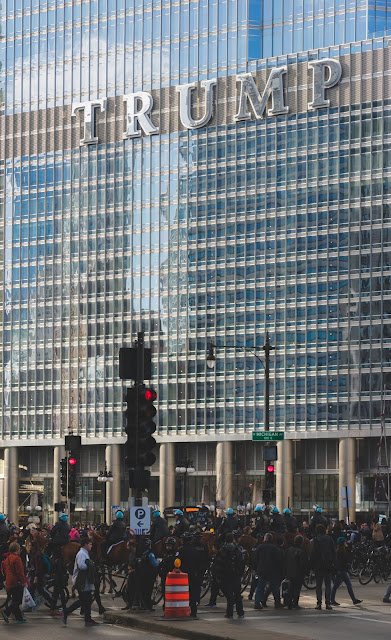All-out War a real possibility as the last "grown-up" leaves the room ..... Trade war, that is.
After a year or so of plenty of rhetoric but little in the way of
action, he's also re-lit the protectionist fire on the issue of trade and this
could turn out to have the most ramifications of all. Catching the most
attention today is news that the Chief Economic Adviser to the White House Gary
Cohn had quit after failing to persuade Mr. Trump that his imposition of tariffs
on imported steel and aluminium (25% and 10% respectively) was a very bad idea
indeed. The market's view is that Mr. Cohn was a safe pair of hands and just
about the last restraining influence at the very top level against what might
be seen as the President's impetuous instincts.
There are plenty of other senior Republican figures who oppose the
move towards protectionism and away from free trade -- most of them
in fact, including Speaker Paul Ryan. But the fact that they seem to have
little or no influence on the President is not doing the market's nerves any
good, nor does it encourage optimism that a lid can be put on this first little
skirmish before it develops into something really nasty ..... for everyone.
The 81,000 steel workers in the US, who've been having a very hard
time of things, were one of the key targets of the pre-election Donald Trump,
and in his campaign the demise in their fortunes came to represent just how an
unscrupulous world had been taking advantage of the US for so long. It's just
possible that artificially boosting the price of steel may benefit them in the
short-term, but the problem is just what it will do for everyone else in the
United States. Far more people are employed in companies that buy steel products
rather than make them, and by definition the move will be a cost to retail
consumers. Where's the logic in that (beyond placating a group that helped to
secure your election) ?
As it happens, the steel/aluminium tariff is a measure that almost
completely misses its target even if you think such actions can be sensible. Mr
Trump's big target is China, who he accuses of dumping cheap steel on the
market at the expense of US workers in the industry. He's right that China in
the past has behaved in a manner that should have seen it punished repeatedly
by the World Trade Organisation, but the fact is that the US imports much more
steel from its allies than it does from China.
Getting tough with China might win Mr Trump some good headlines
but Canada and Mexico (for example) will suffer much more as a result of these
actions. That doesn't bode well for the prospects of a happy conclusion to the
NAFTA negotiations.
In isolation, the new tariffs on steel and aluminium are a
comparatively small issue but there's a massive danger, likelihood even, that
this spat will snowball -- they generally do. It's all very well
boosting the price of the raw materials, but what about products made from
those materials. Such imported products are likely to cheaper
than the home-made competition, so the next step is to slap a tariff on those
too. Sooner or later, other countries will begin to retaliate, and the US'
trading partners the world over are already lining up possible tit-for-tat
moves. Meanwhile, the US is putting together further measures aimed at China
and threatening punitive legal moves in response to alleged (but probably true)
theft of intellectual property. This whole thing is an inch away from getting
out of control.
There's a huge irony that in the cultural home of free markets a
Republican administration has started to implement a protectionist agenda. They
are arguing that they are protecting the nation from the unfair trade practices
of others -- some of their predecessors would argue that they are
propping up old and inefficient industries. Those previous administrations
might also be surprised that Mr Trump and his cohorts seem to believe that
because the US runs a large trade deficit, it would by definition be the winner
in a trade war. It's possible that they might suffer a little less than some
others, but because of the damaging effect of world trade and growth, there are
no winners in a trade war ..... everybody loses. And if Mr Trump really does
believe that the Us will be better off, he's all the more likely to go down
that route. Remember that already infamous tweet on Friday : Trade wars are
good, and very easy to win.
So quickly, what's this done to the markets ? Strength in the
usual safe-havens : Jap Yen, Swissy, Treasury and other government bonds, and
weakness in stocks but these are very early days There are some interesting
questions posed by the possibility of a major trade bust-up. All the talk is of
rising rates and yields (could we now be looking at 4 Fed hikes this year?),
but how would those expectations be undermined by stumbling global growth
resulting from a trade war ? That would indeed take upward pressure off rates,
but on the other hand how inflationary would restrictive trade practices be ?
On our return on Monday we were wondering whether the world was a
different place, in terms of markets that is. Increased volatility readings
imply that it probably is. Of course , the markets have shrugged off negative
concerns a thousand times on the way up but for what it's worth, increased
volatility looks like it's here to stay and with issues like trade wars
bubbling away it's only reasonable to expect markets to be a lot more difficult
than they were last year, tax cuts or no tax cuts.
ref :- "Trump's follies presage more protectionism" ,
Martin Wolf in the Financial Times, Comment



No comments